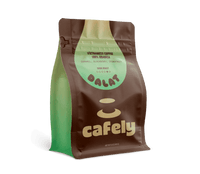The energy-boosting effects of caffeine kick in within 10 minutes and reach their peak around 45 to 60 minutes after consuming a cup of coffee.
With that said, various factors can speed up or slow down its release, including your body weight, the amount of caffeine in the coffee, how much you drink, and how quickly you drink it.
In this article, we’ll be looking at how long it takes for coffee to kick in, how long the energy-boosting effects last, how caffeine is metabolized, and more…
How Long Does it Take for Coffee to Kick In?
The effects of coffee are noticeable after just 10 minutes. Caffeine is absorbed into the bloodstream rapidly and reaches peak concentration between 15 and 45 minutes after ingestion [1].
Depending on how your body reacts to caffeine, you might notice significant changes in energy levels, focus, and mental alertness. How quickly you notice these effects will depend on factors such as body weight, genetics, metabolism, and activity levels. Whether you consume other substances (nicotine for example) with coffee can also affect onset times.
Although the effects of coffee can vary from person to person, there are three stages associated with caffeine consumption.
Here’s how each stage works:
1. The Caffeine Kick (10 Minutes After Ingestion)
The taste of coffee alone can give many people an immediate sense of alertness — a placebo effect. The real caffeine kick (when the caffeine enters the bloodstream) begins around 10 minutes after consumption.
Caffeine is an adenosine receptor antagonist with a high affinity for both A1 and A2A receptors [2]. Adenosine slows down activity along neural pathways in the brain — an action that’s responsible for making us “feel sleepy.”
By temporarily blocking adenosine receptors, caffeine increases neuron firing and causes the nerve cells to speed up. This response increases alertness and temporarily masks feelings of tiredness.
2. The Peak (45–120 Minutes After Ingestion)
Caffeine concentration in the blood reaches its peak approximately 45 to 120 minutes later [1]. During this period, coffee drinkers feel the strongest effects.
Caffeine works as a psychostimulant on the central nervous system, and during its peak concentration, it can make you feel refreshed, focused, and alert.
Depending on your genetic makeup, and how much caffeine you consume daily, it may enhance your processing speed, and physical performance, and improve both short and long-term memory [3].
“The peak” is also the time when negative effects such as jitteriness, dehydration, increased heart rate, and anxiety may be at their highest level.
3. The Caffeine Comedown (3–8 Hours After Ingestion)
Caffeine remains in the body for several hours after consumption. Six hours after drinking a cup of coffee, around half the caffeine remains in your bloodstream. Caffeine also exhibits linear pharmacokinetic behavior, meaning the more coffee you drink the more blood caffeine levels rise [4].
Caffeine remains in the system for around 10 hours in total. Depending on how much you drink and how your body metabolizes it, you may experience an energy boost for much of this time. However, as the caffeine is “flushed” from the system, you may experience a “crash” as your body is alerted to the fatigue that caffeine suppressed.
During the caffeine comedown unpleasant symptoms such as headaches, fatigue, reduced concentration, and irritability may occur.
Some people experience this earlier than others. People with a higher caffeine tolerance may notice the comedown as little as three hours after consumption. People who rarely consume coffee may notice it six to eight hours after consumption.
How to Get as Much Energy Out of Coffee as Possible

If you want to optimize the caffeine energy boost and reduce the severity of the caffeine comedown, start by choosing the best coffee for energy boost, then consider tweaking your daily routine with the following tips:
1. Wait Before Having Your Morning Brew
During sleep, adenosine is recycled and levels are reduced in the brain before you wake up. Adenosine levels are at their lowest first thing in the morning and gradually increase during the day.
Although you may feel the urge to drink a coffee first thing in the morning, it may be better to wait.
According to Dr. Andrew Huberman, waiting 90 minutes for adenosine levels to rise before having your first cup of coffee could make caffeine more effective at blocking the adenosine receptors. In theory, this results in a more sustainable, prolonged energy boost and a less intense “coffee crash.”
2. Avoid Drinking Coffee at Night
As caffeine stays in your system for some time, it’s best to avoid drinking coffee in the evening as it’s likely to affect sleep quality. Caffeine affects sleep differently from person to person but it's best to avoid consuming coffee at least six hours before bedtime.
Leaving enough time for your body to expel the caffeine before sleeping will ensure adenosine levels are restored before waking up — leaving you feeling more refreshed in the morning.
3. Drink Coffee Before Taking a Nap
Contrary to the above statement, drinking a cup of coffee before taking a power nap during the day may prove beneficial if you time it right. The theory is that the short nap (15–20 minutes) clears out some adenosine and the coffee blocks the rest when you wake up.
This dual-action strategy may leave you feeling more alert than drinking a coffee without a nap would [5].
4. Consider Changing Your Coffee Beans
If you usually drink robusta coffee, you are consuming twice the amount of caffeine as you would if you switched to arabica beans. Consider switching things up for times when you need a greater or lesser caffeine hit.
Monitoring your caffeine intake and adjusting it as required can help you use coffee more efficiently. To retain a healthy sleep cycle and benefit from the energy-boosting properties of coffee, you should drink as much as necessary without raising blood caffeine levels excessively.
How Can You Make the Effects of Caffeine Wear Off More Quickly?
Drinking too much coffee can induce unwanted side effects such as increased heart rate, dehydration, headaches, and anxiety.
Here are four tips to help reduce the unwanted side effects of caffeine and ensure the effects wear off faster:
1. Avoid Drinking Coffee on an Empty Stomach
You are likely to feel the effects of caffeine more strongly if you drink coffee on an empty stomach.
If you’re particularly sensitive to caffeine make sure to consume food before or while you drink your first cup of coffee.
2. Avoid Drinking too Much Coffee
The more coffee you drink, the higher your blood caffeine levels become. The more caffeine you have in your system, the higher the likelihood of developing unwanted side effects and the longer the effects will take to wear off.
Avoid drinking more than 400 milligrams of caffeine per day — that’s around four to five cups of coffee.
3. Stay Hydrated
Coffee is a mild diuretic (reduces fluid in the body). If you notice side effects such as headaches, jitteriness, or increased heart rate from drinking coffee, increase your water consumption.
When consuming coffee throughout the day, make sure to drink regular water as well. This will reduce the risk of developing unwanted side effects while helping your body expel excess caffeine more quickly.
4. Increase Physical Activity
You might not feel like exercising when experiencing caffeine-induced jitters, but that doesn't mean that you won't benefit from a walk in the fresh air. Getting your blood pumping through physical activity will help the caffeine wear off more quickly.
If you’re experiencing side effects from drinking too much coffee, take some deep breaths and get outside for a walk or light jog.
FAQs: The Onset Time of Coffee

Want to know more about the effects of coffee on your body?
Here are the answers to some frequently asked questions we’ve received:
1. Is 200 mg of Caffeine a Lot Before a Workout?
200 mg is considered a moderate, safe amount of caffeine to consume before a workout. Caffeine could help with both cognitive function and improved endurance. It may be beneficial to athletes in terms of long-lasting performance and physical ability.
2. Can Caffeine Build Up Cumulatively in Your System?
Yes. Caffeine can build up cumulatively in your system. Caffeine is metabolized by your liver and is expelled via the bladder. However, while you may feel the effects of consuming too much caffeine it will be expelled within 10 hours after the last cup.
3. Is Coffee Beneficial for People With Attention Deficit Hyperactivity Disorder (ADHD)?
Caffeine may improve cognitive function and boost dopamine production — factors that are beneficial to attention and focus. However, caffeine affects people with ADHD differently. Some claim it helps improve concentration whereas others claim it makes them tired.
Drinking coffee may prove advantageous to those who struggle to concentrate. However, more research is required to prove the effectiveness of coffee consumption in people with ADHD.
References
- Arnaud, M. J. (1987). The pharmacology of caffeine. Progress in drug research/Fortschritte der Arzneimittelforschung/Progrès des recherches pharmaceutiques, 273-313.
- Reichert, C. F., Deboer, T., & Landolt, H. P. (2022). Adenosine, caffeine, and sleep–wake regulation: state of the science and perspectives. Journal of sleep research, 31(4), e13597.
- Reddy, S. V., Shiva, S., Manikantan, S., & Ramakrishna, S. (2024). Pharmacology of caffeine and its effects on the human body. European Journal of Medicinal Chemistry Reports, 10: 100138.
- Roberts, A. (2021). Caffeine: an evaluation of the safety database. In Nutraceuticals (pp. 501-518). Academic Press.
- Hayashi, M., Masuda, A., & Hori, T. (2003). The alerting effects of caffeine, bright light and face washing after a short daytime nap. Clinical Neurophysiology, 114(12), 2268-2278.












